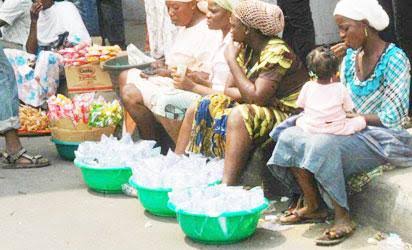The soaring cost of living in Nigeria is now impacting the accessibility of essential commodities like sachet and bottled water, with prices reaching unprecedented levels. Currently, a bag of sachet water is priced at N500, while bottled water in certain cities is being sold for N300 per bottle.
Water, being crucial for bodily functions, has become a casualty of the economic downturn, leading to a revival of an old practice from the 90s: the sale of iced water in transparent nylons.
The trend has emerged as even affluent Nigerians seek ways to economize on water consumption. Some have resorted to repurposing used bottles to carry sachet water instead of purchasing expensive bottled water, which has seen its price surge to N300 per bottle in some areas.
Others have turned to boiling borehole water and transferring it to empty bottles after cooling, a makeshift solution born out of necessity. However, this shift has resulted in reduced patronage and declining incomes for beverage vendors.
Amidst this economic strain, sellers have rediscovered the viability of selling iced water, a cost-effective alternative that resonates with consumers. Sellers peddling these chilled nylon packs of water can now be found in school areas, marketplaces, and motor parks across smaller towns and cities nationwide.
Mrs. Dorathy Ehis, a water vendor based in Benin, shared her experience, stating, “I never imagined selling ice water again in Nigeria since the 90s. But with the relentless increase in the prices of sachet and bottled water, many are resorting to borehole water. My sachet and bottled water business are stagnant. A bag of sachet water now sells for N500, up from N300 just a few months ago.”
Similarly, Mrs. Sandra Momoh, who sells snacks and water outside a public school, highlighted the financial constraints faced by students, making sachet water unaffordable. She emphasized the growing demand for cheaper alternatives like iced water.
Acknowledging the health risks associated with consuming unclean water, particularly from boreholes, Mrs. Momoh stressed the importance of government intervention to ensure the affordability and accessibility of clean water, thus preventing waterborne diseases and saving lives.
The World Health Organization’s 2022 State of the World’s Drinking Water report underscores the urgency of addressing water accessibility issues. With over 1.5 million deaths annually attributed to unsafe drinking water, primarily affecting children, urgent action is needed to meet the Sustainable Development Goal of universal access to safe drinking water by 2030.
The report emphasizes the fragility of progress made in improving water accessibility, highlighting the need for sustained investment, monitoring, and upkeep. External factors such as climate change, urbanization, and population growth further compound the challenges, necessitating comprehensive strategies to ensure safe water access for all Nigerians.
This signifies a broader struggle to afford clean drinking water, leading to health risks associated with consuming unclean water, as highlighted by Mrs. Dorathy Ehis and Mrs. Sandra Momoh. The situation shows the urgent need for the government to address the cost of producing and providing clean water to ensure accessibility and affordability, ultimately saving lives and preventing waterborne diseases, as emphasized by the World Health Organization’s report.





